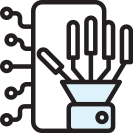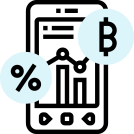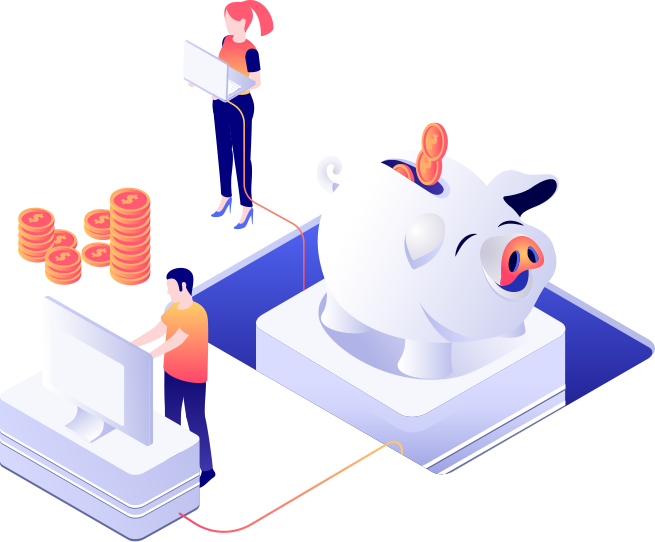
Access 250+ commission-free ETFs
PSS offers best in class ETF investing experience to both professional and newbie investors. With more than 250 free of commission ETFs, as well as tools that complement them, find the ideal opportunities for achieving your financial goals. Our ETFs come from highly trusted and recognized companies globally.
- ETFs from industry-leading fund companies
- Broad selection of asset classes from equities to commodities
- Niche exposure to complement the foundation of your portfolio

Benefits of trading ETFs
- Fully diversified within and across asset classes
- Lower margins, higher leverage
- Deep and constant order settlement
- Easy to analyze and monitor
ETFs are elastic but diversified investments. They are a collection of hundreds of investments Which are traded on major exchanges around the world and can be conveniently purchased and sold. Additionally, investors can trim down volatility in their trading and reduce overall risk by diversifying their investment over multiple assets through a single instrument.
Professional ETF
management


Basics of ETF Market
What is definition of EFT market?
Exchange traded funds (ETFs) are baskets of securities that trade intraday like individual stocks on an exchange and are typically designed to track an underlying index. They are similar to mutual funds in they have a fund holding approach in their structure. That means they have numerous holdings, sort of like a mini portfolio.
Each ETF is usually focused on a specific sector, asset class, or category. ETFs can be used to help diversify your portfolio, or, for the active trader, they can be used to profit from price movements. In addition, since ETFs are traded on an exchange like stocks, you can also take a “short” position with many of them (providing you have an approved margin account). A short position allows you to sell an ETF you don’t actually own in order to profit from downward price movement. Note that shorting a position does expose you to theoretically unlimited risk in the event of upward price movement.
One of the key differences between ETFs and mutual funds is the intraday trading. Mutual funds settle on one price at the end of the trading day, known as the net asset value, or NAV. ETFs are traded on the exchange during the day, so their price fluctuates with the market supply and demand, just like stocks and other intraday traded securities.
What are characteristics of ETF investing?
Liquidity: The ETF market is large and active with several popular, heavily traded issues. This makes it easier to get in and out of trades. However, liquidity varies greatly, and some narrowly focused ETFs are illiquid.
Choices: There is a huge variety of ETFs to choose from across different asset classes, such as stocks and bonds. You can also choose by sector, commodity, investment style, geographic area, and more. Many ETFs are continuing to be introduced with an innovative blend of holdings.
Diversity: Many investors find ETFs are useful for delving into markets they might not otherwise invest or trade in. Since they are baskets of assets and not individual stocks, ETFs allow for a more diverse approach to investing in these areas, which may help mitigate the risks for many investors.
Commissions and Fees: ETFs typically trade by commission; however PSS offers access to more than 250 commission-free ETFs. In general, an ETF tends to be more cost-efficient than an actively managed mutual fund, because of its indexed nature. This often results in lower fees.
What are typical trading strategies to invest in ETF market?
Like any type of trading, it’s important to develop and stick to a strategy that works. Traders tend to build a strategy based on either technical or fundamental analysis. Technical analysis is focused on statistics generated by market activity, such as past prices, volume, and many other variables. Charting and other similar technologies are used. Fundamental analysis focuses on measuring an investment’s value based on economic, financial, and Federal Reserve data. Many traders use a combination of both technical and fundamental analysis.
Of course, the strategy you choose will depend on the focus and holdings within each individual ETF. For example, a corporate bond ETF will depend on fundamental research, such as a company’s credit rating, past and future earnings, as well as the economic outlook for their industry. An ETF that tracks a stock index, for example, will warrant a strategy built on technical data of that index, or fundamental analysis centered on how the stock market may be impacted by the overall economy, or a combination of both.
What are the Different Types of ETFs?
There are many types of Exchange Traded Funds. Some of the most common ETF include:
Stock ETF – these hold a particular portfolio of equities or stocks and are similar to an index. They can be treated like regular stocks in that they can be sold and purchased for a profit, and are traded on an exchange throughout the trading day.
Index ETF – these mimic a specific index, such as the S&P 500 Index. They can cover specific sectors, specific classes of stocks, or foreign or emerging markets equities.
Bond ETF – an exchange traded fund that is specifically invested in bonds or other fixed-income securities. They may be focused on a particular type of bond or offer a broadly diversified portfolio of bonds of different types and with varying maturity dates.
Commodity ETF – hold physical commodities, such as agricultural goods, natural resources, or precious metals. Some commodity exchange traded funds may hold a combination of investments in a physical commodity along with related equity investments. For example, a gold ETF might have a portfolio that combines holding physical gold with stock shares in gold mining companies.
Currency ETF – these are invested in a single currency or a basket of various currencies and are widely used by investors who wish to gain exposure to the foreign exchange market without directly trading futures or the forex market. These exchange traded funds usually track the most popular international currencies, such as the U.S. dollar, Canadian dollar, Euro, British pound, and Japanese yen.
Inverse ETF – An inverse exchange traded fund is created by using various derivatives to gain profits through short selling when there is a decline in the value of a group of securities or a broad market index.
Actively Managed ETF – these ETFs are being handled by a manager or an investment team who decide the allocation of portfolio assets. Because they are actively managed, they have higher portfolio turnover rates as compared to, for example, index funds.
Leveraged ETF – Exchange traded funds that mostly consist of financial derivatives that offer the ability to leverage investments and thereby potentially amplify gains. These are typically used by traders who are speculators looking to take advantage of short-term trading opportunities in major stock indexes.
Real Estate ETF – These are funds invested in real estate investment trusts (REITs), real estate service firms, real estate development companies, and mortgage-backed securities (MBS). They may also hold actual physical real estate, including anything from undeveloped land to large commercial properties.
Carefully consider the investment objectives, risks, charges and expenses before investing.
ETFs are subject to risk similar to those of their underlying securities, including but not limited to market, investment, sector, or industry risks, and those regarding short-selling and margin account maintenance. Some ETFs may involve international risk, currency risk, commodity risk, leverage risk, credit risk and interest rate risk. Performance may be affected by risks associated with non-diversification, including investments in specific countries or sectors. Additional risks may also include but are not limited to investments in foreign securities, especially emerging markets, real estate investment trusts (REITs), fixed income, small-capitalization securities and commodities. Each individual investor should consider these risks carefully before investing in a particular security or strategy. Investment returns will fluctuate and are subject to market volatility, so that an investor’s shares, when redeemed or sold, may be worth more or less than their original cost. Unlike mutual funds, shares of ETFs are not individually redeemable directly with the ETF. Shares are bought and sold at market price, which may be higher or lower than the net asset value (NAV).
Information provided by PSS is for general educational and informational purposes only and should not be considered a recommendation or investment advice.
Particular commission-free ETFs may not be appropriate investments for all investors, and there may be other ETFs or investment options available at PSS that are more suitable.
PSS receives remuneration from certain ETFs (exchange-traded funds) that participate in the commission-free ETF program for shareholder, administrative and/or other services.
Short-Term Trading Fee (Holding Period for 30 Days). ETFs available commission-free that participate in the ETF Market Center may be subject to a holding period that commences with any purchase and extends through the following THIRTY (30) calendar days. An account owner must hold all shares of an ETF position purchased for a minimum of THIRTY (30) calendar days without selling to avoid a short–term trading fee where applicable.
Neither Morningstar Investment Management nor Morningstar, Inc. is affiliated with PSS and its affiliates. Morningstar, the Morningstar logo, Morningstar.com and Morningstar Tools are either trademarks or service marks of Morningstar, Inc.
Educational resources are provided for general information purposes only and should not be considered an individualized recommendation or advice.
This is not an offer or solicitation in any jurisdiction where we are not authorized to do business or where such offer or solicitation would be contrary to the local laws and regulations of that jurisdiction, including, but not limited to persons residing in Australia, Canada, Hong Kong, Japan, Saudi Arabia, Singapore, UK, and the countries of the European Union.
PSS does not offer its services to persons residing in the United States of America.
Request a call from our
dedicated team today.
Let’s build a relationship
get in touch
- Call, email 24/7 or visit a branch
- + 47 80 06 21 53
- helpdesk@pssinvest.com
Be sure to make appointment before you visit our branch for online trading service as not all branches have a financial service specialist.

